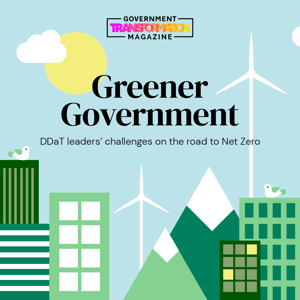Exploring DDaT leaders’ role in the sustainability agenda
What's playing on the minds of Digital, Data & Technology (DDaT) leaders when it comes to sustainability?
A new report conducted by Kin + Carta, in partnership with Government Transformation Magazine, takes a closer look at the challenges faced by DDaT leaders in central government departments within the UK Civil Service as they work towards achieving Net Zero targets.
Through a combination of quantitative surveys and qualitative interviews with over 100 DDaT leaders, the study explores the perceptions, priorities, and progress of government departments in their sustainability efforts. It emphasises the role of technology in driving sustainable initiatives - and identifies barriers that need to be addressed to accelerate the journey towards a greener government.
‘Misplaced confidence’
What emerged is a story of 'misplaced confidence' among DDaT leaders when it comes to tackling the challenge of Net Zero.
There is a strong belief that Net Zero targets are attainable; the majority (78%) expressed confidence in their department's ability to reach Net Zero targets - signalling an optimistic outlook. However, the study finds it is not consistently prioritised, undermining this confidence and hindering progress. In fact, only 35% of DDaT leaders consider it a top priority.
expressed confidence in their department's ability to reach Net Zero targets - signalling an optimistic outlook. However, the study finds it is not consistently prioritised, undermining this confidence and hindering progress. In fact, only 35% of DDaT leaders consider it a top priority.
A Sustainability Professional from a large government department attests to the deprioritisation of sustainability: “I went to a Treasury presentation last year, and sustainability in the environment was not among the nine priorities listed. For sustainability and climate change in general, that’s pretty typical."
Similarly, the majority of DDaT leaders (74%) feel their wider organisation is supportive of Net Zero strategy. But again, further findings indicate that this confidence is overplayed: with 40% admitting that the lack of appropriate technology is a problem, and a further 41% stating that departments do not communicate Net Zero’s importance to employees.
Chris Howes, Group Chief and Digital Information Officer, Department for Environment, Food and Rural Affairs (Defra), agrees DDaT leaders’ responses suggest over-confidence in their departments’ level of Net Zero prioritisation and progress. As an example, he cites the lack of data that exists to drive a switch to low-carbon processes: “Reporting is still not sufficient, either at a project level or aggregated level. There’s an awful lot for us to do to get our business processes and data, in the widest sense, to support better decision-making on sustainability.”
Barriers to Progress
Several barriers are seen to be impeding progress towards Net Zero, including inadequate technology and infrastructure (40%), insufficient investment (30%), a lack of internal expertise (29%) and a lack of data (24%).
The report stresses that it is only by recognising these obstacles “rather than painting over them with bravado” that sustainability strategy will rise up the agenda.
A general lack of tools and insight across the board means it is difficult for DDaT leaders to even begin plotting a coherent strategy. For example, the inability of procurement experts to fully scrutinise suppliers’ Net Zero claims and a lack of low-carbon expertise.
As Natalie Jones, Director of the GOV.UK One Login Programme at Government Digital Services (GDS) stated: “The biggest barrier is just understanding how to get started. It’s a wickedly complicated problem. There’s no real practical guide showing how to make even a 1% gain.”
A lack of consensus on cross-governmental strategy means there is insufficient guidance on how to prioritise Net Zero. With this in mind, Terry Makewell, Chief Technology Officer at the UK Hydrographic Office (UKHO) states that it is vital to develop a common language around sustainability: “When you’re in a small technology group [jargon] is fine. But if you want people who are generalists to grasp things, use of common language is needed. I think technologists sometimes fail in that area. That can lead to differing views around aspects you thought everyone had agreed on.”
Valuing DDaT’s role
DDaT leaders are expected to be at the forefront of driving sustainable change across government. The digital and data roadmap states as part of its Net Zero plan that: “It will require a step change in the rate of new technologies and processes being developed and deployed.”
Against this backdrop, DDaT leaders recognise their key role in shaping government sustainability agendas; with 41% stating digital investment as their department’s main strategy for achieving Net Zero and a further 35% stating that improving data collection and analysis is a key part of their strategy.
At the same time, there is an appetite among DDaT leaders to take a level of responsibility for Net Zero and the actions required to achieve it (64%). However, just as many (66%) see it as a box-ticking exercise rather than a driver of value, while 61% admit their focus is often elsewhere and a third (33%) do not feel equipped to make a significant contribution.
A combination of not prioritising sustainability strategy, and feeling they don’t have the mandate to do so, or the resources needed, is holding them back, the report finds.
Defra’s Chris Howes highlights what actions are being taken: “We’ve taken big steps in some areas to clarify our intent,” he says. “We’ve created a ‘green government’ ICT digital services strategy, for example, which gets sustainability into the technology code of practice. But if we look at the level of capability in the technology function across government there’s still a lot more to do.”
Terry Makewell at UKHO added: “A year ago, we defined our commitment to a Net Zero target. Earlier in 2023, we appointed our first head of sustainability for the UK, to consolidate this and remove silos of work, which has brought real leadership in this area.”
You can download the full report now, which includes more in-depth insights from DDaT leaders - as well as key recommendations to address the challenges and accelerate progress towards Net Zero.






%20(1).jpg?width=600&name=Chair%20Photo%201.4%20(002)%20(1).jpg)